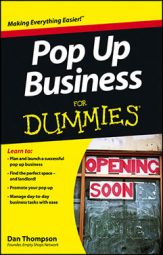You must carefully monitor sales for your pop up business, particularly where multiple partners are involved in the pop up, such as a shop shared by artists and makers.
Producing a clear sales sheet at the end of the pop up is essential, to set out your opening stock, any sales and what stock is left at the end. To produce this sales sheet:
Count and record all stock before you open.
Record all sales and any losses through damage while you’re open.
Count closing stock, which should equal the amount of all the items from point 1 minus those from point 2.
Stock control
Stock control systems can cost you hundreds of thousands, with complicated computer systems, bar codes and warehouses. Most pop ups don’t have anything near that complicated.
All the most simple or the most complicated stock control system does is record:
What items you have.
How many items exist.
The wholesale and the retail price of each item.
Where the stock is stored.
The most effective way to control stock for a pop up is probably the simplest. Create a document with four columns. Fill these in as stock is delivered to the pop up:
| Item | Quantity | Wholesale Cost | Retail Price | Stored |
|---|---|---|---|---|
| She Makes War CD | 10 | £5 | £10 | Shelf 1 |
| Mocking Kevin CD | 5 | £3 | £8 | Shelf 2 |
Sales record
You need to record all sales. You may opt to use a bar code system or a till that records sales automatically.
If not, and if you’re managing sales for a number of partners, you need to record all sales to ensure that you can balance your stock against your sales.
To record sales for your pop up, create a document with four columns and keep a copy on your sales desk.
| Item | Artist | Quantity | Total price |
|---|---|---|---|
| Kitesurfing painting | Tracey Thompson | 1 | £450 |
| Landscape drawing | Debbie Zoutewelle | 2 x £30 each | £60 |
| Photo | Nathan Bean | 1 | £300 |

